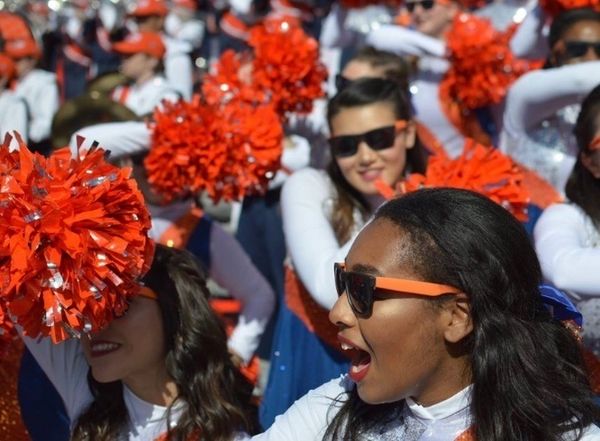Across the country, there are upwards of 7.8 million high school athletes, according to a 2014 High School Athletics Participation Survey conducted by the National Federation of State High School Associations. Of those nearly eight million 14- to 18-year-olds, only 460,000 go on to compete in one (or more) of the 24 sports offered by the National Collegiate Athletic Association, better known as the NCAA. That means that only 5.75 percent of people who see themselves as athletes in high school can still say they are in college.
That number seems incredibly small to me. In high school, I knew so many incredible athletes, and I can confidently say that much more than 6 percent of the student-athletes I knew went on to play their sport at Division I, II, or III colleges.
Now, let me be clear. The purpose of this article is not to criticize those athletes who have chosen not to continue with athletics in college. There are many reasons why people choose not to further pursue a sport after high school — infinitely many, really — and it is never one person's privilege to judge another for that choice, no matter the reason or circumstance.
The purpose of this article is to commend each of those 460,000 athletes who did continue. You have made it so far. You have gotten through thousands of hours of practices, hundreds of sessions of extra reps and years of training. You have battled with different coaches' personalities and found your own game day persona somewhere in the mix. You have given up opportunities to go to school dances or friends' parties for games and practices. You have foregone hours of class to go to warm ups. You have spent more money than imaginable on gas and flights to get to practices, scrimmages, showcases, tournaments, qualifiers, nationals. You have failed many times, yet you come right back to the sport you love and have committed to time and time again.
I am sure there have been times when you thought you were done with the sport. You thought you couldn't possibly get any more out of it than you already had, but something in you, whether your head, heart, or gut, told you it was not time to hang it all up. Your commitment to the game is a choice you make over and over again each day, and it may be an especially difficult one on those days when you feel like you are at a dead end.
Now, you've made it to college. And you are still playing this sport. Ask yourself: do you know why? At first thought, you might feel like it's out of habit, just something you can't quite get away from. But then you realize, there is so much more to it. Playing the game betters you in every possible way.
Playing your sport is how you learned what passion feels like.
This word, "passion", was tossed around by a lot of coaches growing up, but it took a while for it to really click. Now, you know that your game day mindset is your most powerful state. You look forward to each opportunity you get to show your preparation, not because you are proud of yourself, but because you are proud of your team.
It is also how you learned what family is.
Sure, you have family at home, but your team is a family you choose. If you go to college away from home, then you definitely see your teammates and coaches more than your parents. Just as you want to make your parents proud, you want to make your team proud. You want to let them know how much you appreciate their constant support in the only way that makes sense — by giving all you've got in the game.
You learn how to integrate quickly.
You start off on a team as sort of an outsider, the new kid, but quickly, you learn to mix with your teammates. Soon, you know way more about these people than you wish you did, but that makes it even more fun to be together.
You learn what it is like to have self-discipline.
Pushing yourself on the next 10 reps when you are already beat, grabbing your knees and gasping for air, hoping someone pours water on you so you don't have to squeeze the bottle yourself — yeah, that's hard, but you can do it. You have done it before, and you'll do it again because you know how good it feels when you finally make that stretch of a play you have been working so hard to make.
You learn what real balance is.
You're probably still working on this one — we all are. But you're a little bit ahead of the curve. You know that when practice is done, you have to actually get your work done, because you have practice again tomorrow, and it's not something you can just skip to finish that assignment. Each spare minute counts so much more because you have fewer overall minutes to spare.
You know what it is like to take on different roles, even around the same people.
You might have to be the leader on the field one day, the cheerleader the next. And you embrace both of these roles, because it's not about you, it's about the team.
You have learned to care about something bigger than yourself.
This one might have been difficult at first, because you had to improve in order to be an asset to a team, and that requires focusing on your own skill set. But after years of focus, doing extra reps is no longer about improving yourself as an athlete, it is about elevating the level of play of your team. So you encourage your teammates to go out and put in work with you, to add more weight when they bench and squat, and to repeat that one thing they want to get better at just one more time for good measure, even though the last five reps were already perfect.
Like I said before, there are infinitely many reasons for giving up athletics in college. Maybe you want to go to medical school, and someone suggests that, for the sake of your grades, you choose between that goal and athletics. That might be a reason for one person to give it up, but for another, it might be motivation to keep going. Or, when you start college, you realize that there are so many other activities to be involved in, clubs and organizations that you didn't even know existed. And you want to do it all.
Your roommate or your friends might tell you to slow down because you're spreading yourself too thin with school, a sport and a club or two. But here's the thing: you don't feel like you are spreading yourself too thin because your sport is a part of who you are. You may not even realize that it is a choice, that there is a choice. You have been doing it for so long, there's no way you could imagine your life without the sport. It brings you a joy you couldn't find anywhere else.
And so, I commend you on your ability to commit so fully without even realizing you did. I commend you for making the unconscious choice every day to be better than you were the day before and for doing that so selflessly.
Now, get out there. It's game day.





















